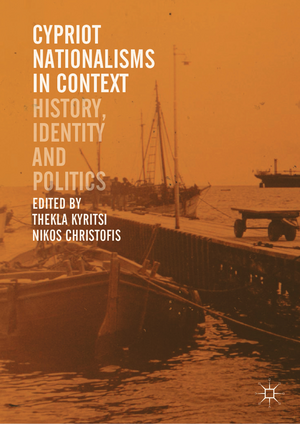Cypriot Nationalisms in Context: History, Identity and Politics
Editat de Thekla Kyritsi, Nikos Christofisen Limba Engleză Hardback – 16 dec 2018
| Toate formatele și edițiile | Preț | Express |
|---|---|---|
| Paperback (1) | 781.62 lei 43-57 zile | |
| Springer International Publishing – 17 feb 2020 | 781.62 lei 43-57 zile | |
| Hardback (1) | 792.03 lei 43-57 zile | |
| Springer International Publishing – 16 dec 2018 | 792.03 lei 43-57 zile |
Preț: 792.03 lei
Preț vechi: 965.88 lei
-18% Nou
Puncte Express: 1188
Preț estimativ în valută:
151.60€ • 164.73$ • 127.43£
151.60€ • 164.73$ • 127.43£
Carte tipărită la comandă
Livrare economică 21 aprilie-05 mai
Preluare comenzi: 021 569.72.76
Specificații
ISBN-13: 9783319978031
ISBN-10: 3319978039
Pagini: 294
Ilustrații: XVII, 340 p. 4 illus., 2 illus. in color.
Dimensiuni: 148 x 210 x 27 mm
Greutate: 0.73 kg
Ediția:1st ed. 2018
Editura: Springer International Publishing
Colecția Palgrave Macmillan
Locul publicării:Cham, Switzerland
ISBN-10: 3319978039
Pagini: 294
Ilustrații: XVII, 340 p. 4 illus., 2 illus. in color.
Dimensiuni: 148 x 210 x 27 mm
Greutate: 0.73 kg
Ediția:1st ed. 2018
Editura: Springer International Publishing
Colecția Palgrave Macmillan
Locul publicării:Cham, Switzerland
Cuprins
1. Introduction: Cypriot Nationalism(s) in Context; Nikos Christofis and Thekla Kyritsi.-PART I: EARLY AGENTS OF NATIONALISM.- 2. The Rise of Greek Cypriot Nationalism to Hegemony: Agency, Particularities and Popularization; Yiannos Katsourides.- 3. National Identity, Otherness and Bi-communal Relations through the Cypriot Greek-speaking Press between 1878-1912; Petros Nikolaou.- 4. The Legislative Council (1882-1931) and its Historical/Political Implications in Cyprus; Meltem Onurkan-Samani.- 5. Engendering Nationalism in modern Cyprus: The First Women’s Organizations; Thekla Kyritsi.- PART II: MOMENTS OF A MASS MOVEMENT.- 6. Cyprus in the 1940s: the Nationalization of Greek Cypriot Politics; Dimitris Kalantzopoulos.- 7. Imported Nationalism: The Appearance and Evolution of “X” Organization in Cyprus; Alexios Alecou.- 8. Nationalism and Failed Reunification Attempts: Makarios and “Bu Memleket Bizim”; Şevki Kıralp.- PART III: NATIONAL IDENTIY & THE DEVELOPMENT OF PREJUDICE.- 9. Between Nationalist Absorption and Subsumption: Reflecting on the Armenian Cypriot Experience; Sossie Kasbarian.- 10. Turkish Migration into the North of Cyprus and the (re)Construction of Turkish Cypriot Identity in the Turkish Cypriot Press (1995-2013); Mustafa Çıraklı.- 11. The Development of Prejudice in Children: the Case of Cyprus; Maria Ioannou and Angelos P. Kassianos.- 12. An Appraisal of the Work of Rolandos Katsiaounis: Society, Labor and Anti-Colonialism in Cyprus,1850s-1950s; Andrekos Varnava.- PART IV: THE LOCAL AND THE GLOBAL.- 13. Nationalism as Resistance to Colonialism: A Comparative Look at Malta and Cyprus from 1919 to 1940; Iliya Marovich-Old.- 14. Encountering Imperialism and Colonialism: The Greek and Turkish Left in Cyprus; Nikos Christofis.- 15. Patriots and Internationalists. The Greek Left, the Cyprus Question and Latin America; Eugenia Palieraki.
Notă biografică
Thekla Kyritsi is a PhD candidate in Political Science and History at Panteion University of Political and Social Sciences in Athens, Greece. Her published work includes research on women and the early Cypriot press, gender history and the Political Left, as well as contemporary research on gender inequalities. She is a founding member of the Cypriot NGO “Center for Gender Equality and History”.
Nikos Christofis is an Assistant Professor at the Center of Turkish Studies and at the College of History and Civilization at Shaanxi Normal University, Xi'an, China. He has published extensively in peer-reviewed journals and edited volumes in Greek, Turkish, English and Spanish. He is the co-author of From the French to the Turkish ’68: The Left and the Radicalization of the Student Movement and edited, and contributed to, Cyprus, the Left and (Post)Colonialism (both in Greek). He is a member of the editorial board of the journal New Middle Eastern Studies.
Nikos Christofis is an Assistant Professor at the Center of Turkish Studies and at the College of History and Civilization at Shaanxi Normal University, Xi'an, China. He has published extensively in peer-reviewed journals and edited volumes in Greek, Turkish, English and Spanish. He is the co-author of From the French to the Turkish ’68: The Left and the Radicalization of the Student Movement and edited, and contributed to, Cyprus, the Left and (Post)Colonialism (both in Greek). He is a member of the editorial board of the journal New Middle Eastern Studies.
Textul de pe ultima copertă
This book explores the different perspectives and historical moments of nationalism in Cyprus. It does this by looking at nationalism as a form of identity, as a form of ideology, and as a form of politics. The fifteen contributors to this book are scholars of different scientific backgrounds and present Cypriot nationalisms from an interdisciplinary framework, including approaches such as history, political science, psychology, and gender studies. The chapters take a historical approach to nationalism and argue that the world of nations, ethnic identity, and national ideology are neither eternal, nor ahistorical nor primordial, but are rather socially constructed and function within particular historical and social contexts. As a land that was, and still is, marked by opposed nationalisms – that is, Greek and Turkish – Cyprus constitutes a fertile ground for examining the history, the dynamics, and the dialectics of nationalism.
Caracteristici
Explores the emergence of nationalism as a form of identity, ideology and politics, taking Cyprus as its case study
Considers the changing characteristics and meanings of nationalism from the late nineteenth century to the present day
Puts nationalism in a broader comparative and intellectual context, offering international comparisons and insights from a range of disciplines, such as history, postcolonial studies, politics, economics and gender studies
Considers the changing characteristics and meanings of nationalism from the late nineteenth century to the present day
Puts nationalism in a broader comparative and intellectual context, offering international comparisons and insights from a range of disciplines, such as history, postcolonial studies, politics, economics and gender studies
